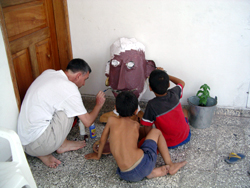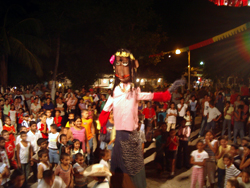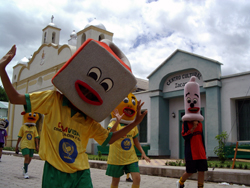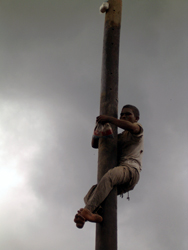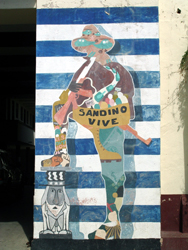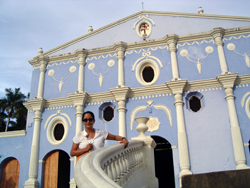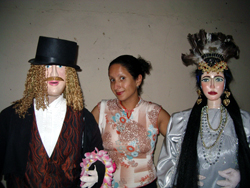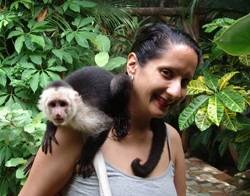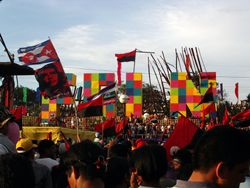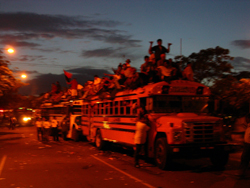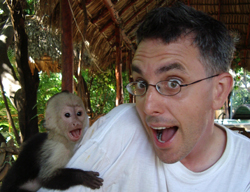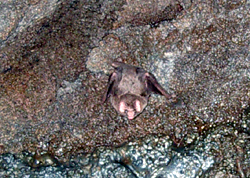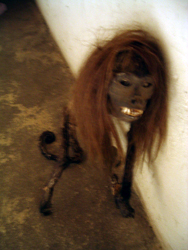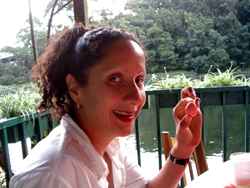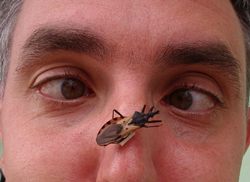More Fun Than a Barrel of Monkeys
Dispatch from Zacapa & Nicaragua - July 2004
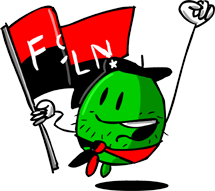
|
|
One Year Later... Once a year, your average Honduras town throws a big celebration in honor of their patron saint. Zacapa is one such town and what better way to celebrate our own one-year anniversary of being in Honduras (although due to the illogical programming requirements we are not yet quite half way through our two year stint). Boy, it's gone so quickly but looking back we have achieved many of the goals we set out with and with time left to do more for the good people of this fine and outstanding banana republic. |
| The Great Zacapa Carnival Caper Thus it was carnival time. Our small slumbering pueblo was deluged with activity for seven loud and rowdy days during which everyone gets drunk and very loud firecrackers were set off at 4:30AM every morning in a traditional "ceremony" called "La Alvorada". The town was tarted up with cheery bunting hung from every lamp and fixture, stages were erected in each neighborhood and most curiously, trees were ripped up to plant shrubs (which in tuirn were ruthlessly tampled by the throngs). For the first time ever taxis could be seen trawling the streets. Strangers flocked into town. Stalls were set up around the main plaza including kiddy rides and "tombola" type games. Our humble contribution was in the form of a 12 foot high giant puppet based on a traditional Honduran design called a “mojiganga” which waddled out into the crowded streets to much awe. |
Mojiganga
head (left) under construction and basil plant in bucket (right) |
|
There was talk this year of canceling the "Feria" because it is so expensive. Although most of the funds are donated during fundraising events leading up to the big week, there is no big economic"boom" afterwards like say if Zacapa hosted the Olympics or the World Cup. Knowing about the million dollar firework displays that take place on July 4th across the US, I naturally assumed that the biggest expense would be all the firecrackers (hoping maybe that next year they would cut them from the budget) but a rocket costs only six Lempiras (about 30 US cents). Tourism has not yet taken off in Honduras, let along in the small pueblos nestled among the mountains that you can only reach on dirt roads or helicopters. |
| There was an excellent HIV/AIDS awareness soccer match between a “Life” team and a ‘Death’ team. All the players wear big costumes--syringes, condoms, a padlock (for abstinence apparently, like a chastity belt), a bottle of alcohol, etc. In a closely fought contest, the life team came from behind to win 3-2 after the syringe got sent off. There were two penalties. It was pretty excellent. My
favorite "Feria" moment was when the BB pellets from the shooting
gallery started going through the back of the stall and through the
window of the post office. |
|
|
|
Unfortunately, not all the fun is jovial and joyous. There is also a greased pig contest and a rodeo where savagely starved cattle are yanked about on ropes and ridden on to apparent great applause. Also there is a ‘Rey Feo’ (ugly king) coronation and lots of parades. Who doesn't love a parade? One of the saddest moments was watching a poor ratty kid risk his life to climb a 20 foot high greased poll in an agonizingly slow and tense fashion to retrieve 450 Lempiras (about $25) at the top. Egged on by hundreds of onlookers, it was the undoubted hit of the week but it all seemed so...well, pointless. The poor boy did finally get his prize but collapsed and feinted when he slid back down to tierra firma, his feet and hands blistered and bleeding whereupon he was mobbed, revived and carried away on adoring shoulders. |
¡Viva Sandino! |
|
|
|
Despite
its recent history of political stability and current “conservative”
government, Nicaraguans still seem incredibly passionate about the events
of the 80s and its aftermath. From
the newspapers and TV reports one could be forgiven for assuming that
Daniel Ortega was still president and the FSLN – who still wield
significant political power—the ruling party. Everywhere Sandinista
flags were draped, pro-leftist or anti-Yankee graffiti sprayed on every
vertical structure the eye could see and myriad celebratory events scheduled.
It all culminated in the Plaza de la Revolution where a big rally was
held on July 19th. We got to see Daniel Ortega and Tomás Borge
speak in an emotional atmosphere of overwhelming patriotism, camaraderie
and jubilation. |
It’s amazing how different Nicaragua is to Honduras. Maybe as a result of the revolutionary period the people seem more passionate and headstrong. They are overwhelmingly friendly and will often share their heartbreaking yet inspiring life stories. This can also be seen in the prevalence of culture. Nicaragua is littered with museums, art galleries, bookstores, culture centers and live music. There are definitely more tourists in Nicaragua, perhaps now attracted by the revolutionary past or the glorious restorations of the colonial buildings of the present. Ché Guevara, Augusto Sandino and rather regrettably that other bastion of anti-US sentiment Osama Bin Laden pepper T-shirts, handicrafts and murals in a near monopoly of iconic imagery. |
|
|
Nicaragua has a lot going for it. Among it’s fauna it boasts three species of monkeys (white-face, black-face and conger or howler) and we managed to see all three in their natural habitats at different times. During a stay at Los Felipes Hotel in Managua, a family of monkeys befriended us (we had little say in the matter). The male monkey called “Lorenzo” —we were told—enjoyed the occasional cigarette, and drank the gut-rotting local alcoholic brew known as “guaro”. The monkeys would come in our room (despite the no smoking sign) and bounce around on the beds and steal things. Other times they were more tranquil and just wanted to be hugged and you eventually had to prize them off with a crowbar and Vaseline. |
In Selva Negra, a cool cloud forest retreat nestled atop a mountain I climbed out of bed at 5AM in the hope of seeing howler monkeys. Unfortunately the monkeys don't get up until 10AM but it wasn't a wasted effort for when they did appear they came as close as the tree we were standing under. We also enjoyed possibly the coldest beer in the world, in Leon where the “frosted” glass actually freezes the foam on impact. Furthermore, there can’t be many places in the world where you can take a $2 taxi-ride up to the lip of an active volcano but in Nicaragua that’s exactly what you can do. What’s more the taxi driver will keep the engine running while you don a yellow safety hat and fading flashlight and descend into a lava tube to see fruit bats. |
|
|
|
You
may not know the name of Susan Meiselas but you know her photographs.
She’s the US photojournalist who took nearly all the now classic
shots of the Nicaraguan Revolution from the masked guerillas hurling
Molotov cocktails to the FSLN tanks driving into the plaza of flag waving
supporters, people dangling and balanced from every viewpoint. As part
of the celebrations she had been putting giant reproductions of her
photos all over Nicaragua in the exact spots where the photos were taken.
A pretty neat project we thought as we spotted them from town to town.
In Masaya we actually caught her in the act of hanging the latest photo
with a helping hand from one of the ex-guerillas who featured in the
photo itself. Thus we were able to take a photo of her in front of her
giant photo in the place where the photo was taken with the person in
the photo. It was a surreal post-modernist moment gone completely bonkers. |
| Managua was leveled by an earthquake in 1931 and after rebuilding it was leveled again in 1972. Over 400 city blocks were destroyed and 10000 people died. Most of the city was completely flattened. We saw some old photos of Managua in their Cultural Center and it was once a majestic and proud city, shadowed by twin volcanoes and a magnificent silver lake (now dangerously polluted). These days the epithet most commonly thrown at it is "post apocalyptic" although you would be hard pressed to find a greener city as from the cracks and rubble has sprouted trees and shrubbery. Nature is reclaiming the metropolis. The old decaying cathedral with it's temporary plastic roof stands as a monument to the event with only the birds granted access. Sadly the post-Sandinista governments have decided to rebuild Managua away from the old buildings and the waterfront around a large US-style shopping mall. The redevelopment of Managua can be summed up by the fact that the best view of Managua, the lake and the volcanoes can be had from directly outside the toilets at the Plaza Inter shopping mall. |
|
|
|
Central American Homesick Blues Returning to Honduras took us into a different frame of mind and launched a thousand more questions, particularly comparisons between the two countries and their place in Central America as a whole. Even Ronald Reagan
was astute enough to comment during his November 1982 Visit to South
& Central America (including Honduras) that “they really are
all different countries down here”. |
Both
Honduras and Nicaragua suffered at the hands of Hurricane “Mitch”
on October 26 & 27 1998. The US quickly dispatched Al Gore’s
wife “Tipper” along with Hillary Clinton to raise Honduran
spirits. International aid crept in agonizingly slowly with Cuba initially
not only providing the most aid but also battalions of medical help
in the form of doctors. In HONDURAS officials reported an estimated
7,000 dead, 1 million driven from their homes, most highways and bridges
damaged, 70% of crops destroyed. Damage was estimated at $10 billion. |
|
|
|
In total the US provided just $250 million in aid (much in the form of cancelled debt or providing loans enabling “small” businesses to reopen.) additionally 2,000 guardsmen from several U.S. states built three medical clinics and four schools, dug four wells and repaired a bridge and 15 miles of damaged highway.
|
|
Honduras of the Heart There are many reasons to love Honduras. For every sad sight or terrible thing it seems like there are two good moments to follow. Every day there is at least one inspirational or magical moment of utter beauty whether it be a preposterously sized mountain piercing an impossibly clouded sky or an innocent child playing for several hours with just a stick and her imagination. There are wandering hills of green that just because they lack a sign pronouncing them some great wonder or national treasure almost go unnoticed. Honduras has potential. In part because of the lack of development it has vast swathes of pristine countryside and coastline. It's mineral rich mountain and agricultural lands promise wealth. No other Central American nation has the same history of agrarian reform or high level of peasant and union activity. But then sadly no other Central American nation has had it's economy so skewed to suit outside interests, or the same depth of corruption. |
|
|
|
Consider the following strikes against Honduras and you will have some idea of the problems the country faces. Honduras has been described as a symbol of failure. It's history is that of a country desperately poor and almost continually at war. Any money not pilfered by governments went on guns rather than seeds. Outside influences, dependence on foreign aid, a swarm of unregulated "faith-based" programs swamping the country and and it's no wonder that Honduras lacks a self-identity. Indeed some would argue that only by breaking this dependence will Honduras be able to move forward. |
|
Hondurans are excellent drivers. I have pontificated this fact during the numerous arduous road journeys we have taken, and come to the conclusion that this is because whereas most societies have drivers who abide by rules of the road, Hondurans are governed by the rules of common sense. It's almost as if without any expectation that someone will stay in a lane or wait for you to pass the Honduran driver has developed a sixth sense to deal with unpredictability. The US driver is programmed to obey traffic as an orderly matrix and when that order is breached there are accidents. To an outsider it seems like Hondurans drive like crazy and alongside the condition of most of the roads it's a death sentence to even think about climbing aboard a truck or bus but amazingly there are fewer accidents per capita here than in the US and Britain. |
|
|
|
Honduras can always make you smile. Sometimes it can be as innocent as a roadside snack stand with "Hot Dog 2000" or "Chicharon.com" painted on the side. Other times it is the general human selflessness of the actions and kindness of people. Whatever the problems here, Honduras will always have it's sense of humor. The next Honduran presidential election falls at the end of 2005, just as we will be leaving. At the moment the two leading candidates for the ruling Nationalist party are Miguel Pastor and Pepe Lobo (who once kissed Julia on the cheek!). This names in English translate to Shepherd and Wolf. In politics that couldn't be more poignant. Until the next dispatch... |
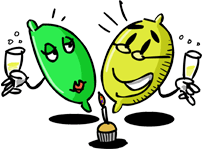
Previous dispatch | Next dispatch
©
J. Lemon / Lemonworld 2005. All rights reserved. This
web site is not an official publication of the Peace Corps or the U.S.
Government. The contents of this Web site reflect the personal opinions
and observations of the individual(s) contributor(s) and do not reflect
any position of the U.S. Government or the Peace Corps. |

